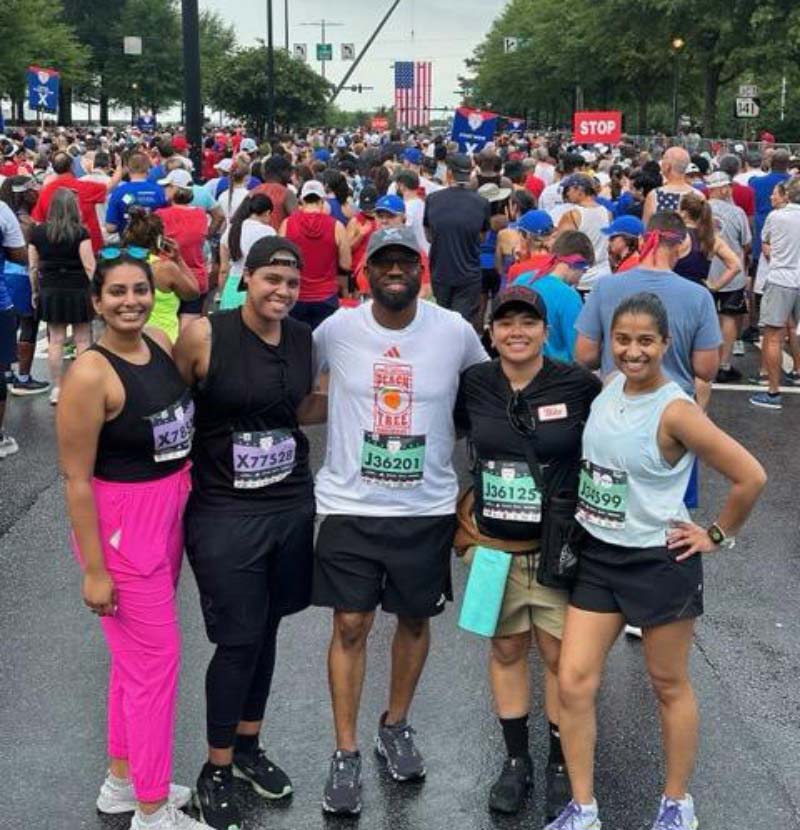An EMT's heart stopped during a 10K race. A cop saved him with CPR.
By Emily Halnon, American Heart Association News

Willie Hatchett was eager and ready for the start of the Peachtree Road Race, a 10K held on July 4 in Atlanta. Hatchett had run it nearly every year for two decades and was confident he could get to the finish line.
The 59-year-old EMT and former firefighter bolted through the sea of runners, working his way toward the first mile marker. That also happened to be the spot where Atlanta Police Department Officer Melina Lim was stationed.
Lim was both working the event and watching for her best friend, who was running the race.
First, the professional athletes flew past her. As the next wave of runners approached, Lim told the crowd around her, "My best friend will be here soon. Get ready to make some noise!"
She held up her phone so she could take a picture of him.
Instead, her screen showed something alarming.
A man was stumbling across the street. His footsteps suddenly stopped. He closed his eyes and fell to the ground. People started tripping over him.
Lim ran across the street to where the man – Hatchett – had collapsed. She bent down and tried to create a barricade with her body so others didn't hit him.
She radioed to her team, "I've got a runner down."
Hatchett's body started seizing. Lim slid her leg beneath his head to protect it from the pavement. A gash over his left eye was gushing blood. He wasn't breathing. She started CPR. Three doctors, who had all been running the race, jogged over to help.
They took turns giving Hatchett CPR. One of the doctors ran to a nearby hotel and brought back an automated external defibrillator, also known as an AED, a machine that can help restore a heart's normal rhythm.
They shocked Hatchett, but he didn't respond.
They kept doing CPR and retrying the AED for 30 minutes without sustaining a healthy rhythm.
An ambulance arrived and paramedics rushed Hatchett to the hospital. On the way there, they peeled off his race bib and found the emergency contact he'd written on the back.
His wife, Nadjo Hatchett, was told her husband had collapsed during the race and was on the way to the hospital.
When Nadjo got to the hospital, she got more news: She couldn't see her husband because he had tested positive for COVID-19.
A doctor called her after she got home and said, "We need him to wake up before we know whether he's experienced brain damage or partial paralysis."
Around 4 a.m., Willie woke up.
The last thing he remembered was leaving home for the run. One of the first things he asked his doctor was, "Did I finish the race?"
His doctor told him he'd gone into cardiac arrest about a mile in.
Cardiac arrest is essentially an outage of the heart's electricity. It can be triggered by a heart attack, which is essentially a plumbing problem. Willie had that; in fact, doctors inserted four stents to clear blockages in his coronary arteries, restoring normal blood flow.
As an EMT used to being on the giving end of CPR, he was overwhelmed by the notion of having been on the receiving end. Plus, he thought he was healthy.
He'd been exercising regularly to get ready for the 10K. Registering for the event gave the former Marine extra motivation to stay in shape throughout the winter and spring.
Outside of feeling a little off a few days before the 2022 race, there were no signs of problems. He later learned there was a history of heart issues in his family.
As Willie's care played out, Lim wondered about his fate.
The last thing she saw was him leaving in the ambulance. The absence of information left her fearing the worst.
Then she remembered something: Her body camera. It captured the information on his race bib. She used that to learn his name and, eventually, made it to Willie.
"You're a survivor," she told him.
Then she filled him in on a promise she'd made after watching the ambulance take him away.
Although she'd never been a runner, she'd vowed, "If he pulls through, I'm running the race next year."
Months later, Willie tested her sincerity.
"Registration is open. Let's do Peachtree together," he told her.
She was all in.
As were the three physicians who'd helped save his life.

Willie wasn't allowed to run the 2023 race, but his doctor cleared him to walk. So, the group lined up together on a rainy July day and celebrated the fact that Willie had another shot at that finish line.
This time, he remembers exactly what happened.
"We finished that race," Willie said. "There were a lot of hugs and cheers along the way."
He said he believes "I got to stay here for a reason. I'm going to keep moving forward and keep sharing my story and hope that it helps someone else survive."
Stories From the Heart chronicles the inspiring journeys of heart disease and stroke survivors, caregivers and advocates.





